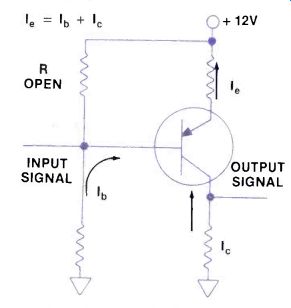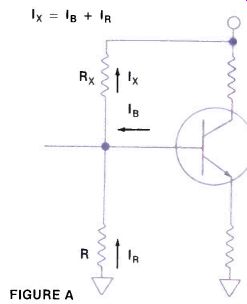Letter to Sam Wilson
In the "Test Your Electronic Knowledge" feature in the July 1987 issue of ES&T, the correct answer to question 10 should be A. According to the schematic diagram, if the resistor marked R is open, the transistor will be saturated, because I_b and I_c still flow to ground through the transistor through Vcc. Therefore the formula Ic= Ib+ Ic still applies.
Moe Myint
Washington, DC

-------
So many people have written about this error that I felt it necessary to give a detailed explanation of the correct answer.
As you know, the correct answer is that the resistor will be saturated. It is sometimes easier to visualize the purpose of R in a right-side-up NPN transistor circuit, so I am enclosing Figure A.

------ Figure A
The question states, "If the resistor marked ‘R' is open, the transistor will be (saturated or cut off)." As shown. by the arrows, the current through Rx is a combination I plus Ih
If R is open, only IR flows through R x. That greatly reduces the drop across R and causes the base voltage to go very high. The resulting increase in base current drives the transistor into heavy conduction (usually saturation). The same situation occurs in the PNP transistor circuit in Figure 5 in the July 1987 quiz.
Thanks again for writing. Your letters are very important to us.
Sam Wilson Interest in electronic organ repair In reference to the August 1987 Feedback letter about electronic organs, I would like to see a series concentrating on the theory and troubleshooting of these pieces of equipment, especially the smaller keyboards. I feel more people have these because of their inexpensiveness, and they tend to need servicing more often because of their portable nature, which makes them prone to disaster (from moisture, dust, fumble fingers, etc.)
Ray Tweedale, Jr., CET Milwaukee, WI
From our readers' responses, it does seem that a series of articles on servicing electronic articles would be useful to ES&T readers.
If any of our readers would be interested in writing such an article, please contact the editor at: Intertec Publishing, P.O. Box 12901, Overland Park, KS 66212.
In the August feedback a reader requested an article on electronic organs. Perhaps this is a subject to be covered, perhaps not, as it is a rather specialized field and is slowly dying as companies, one by one, cease to produce product or have them designed and built overseas.
I have been servicing organs (or keyboards as they are called today) for almost 30 years. I have always tried to help techs from other locations who get themselves into an organ and find that it is a world of its own. (I get lost in a TV chassis.) At one time the organ industry was very large, but at this time there appear to be only four companies left that are producing organs in this country. Many of the others are now just service organizations.
The modern-day organ or keyboard is actually a computer that plays music. Digital technology using PCM and MIDI interfacing is now the thing. While most instruments are similar on the outside and can do many of the same things, each company does it differently. If technicians have a good electronics background with some basic computer or digital training, along with some musical knowledge, they should be able to service the newer products. Most of the remaining companies will supply service information for a fee; however, one must usually be affiliated with a dealer in order to get parts or be willing to accept COD shipments with some sort of minimum order.
If you are not already aware, there is an organization for organ technicians that is growing every day. It is known as MITA International (Musical Instrument Technicians Association) and is based in St. Louis, MO. It puts out a monthly newsletter to its members, and is running service seminars throughout the country, now that the companies do not. Membership is $25 a year for a tech, and it is fast becoming a clearinghouse for information as to what is happening in the industry. Contact Ken Gurler, Editor, MITA News, 8216 Audrain Drive, St. Louis, MO 63121-4504; 314-389-3290. There have also been many super service companies springing up that are sources for parts for the older instruments that the individual companies no longer wish to keep in inventory. Keyboard Systems puts out a parts cross-reference for solid-state items used by the organ companies, and also lists all the present company service addresses. The company's address is:
3637 East 7800 South, Salt Lake City, UT 84121.
They are also a good source for older organ tubes.
Richard M. Johnson
Wakefield, MA
Also see: Test your electronics knowledge. By Sam Wilson, CET.